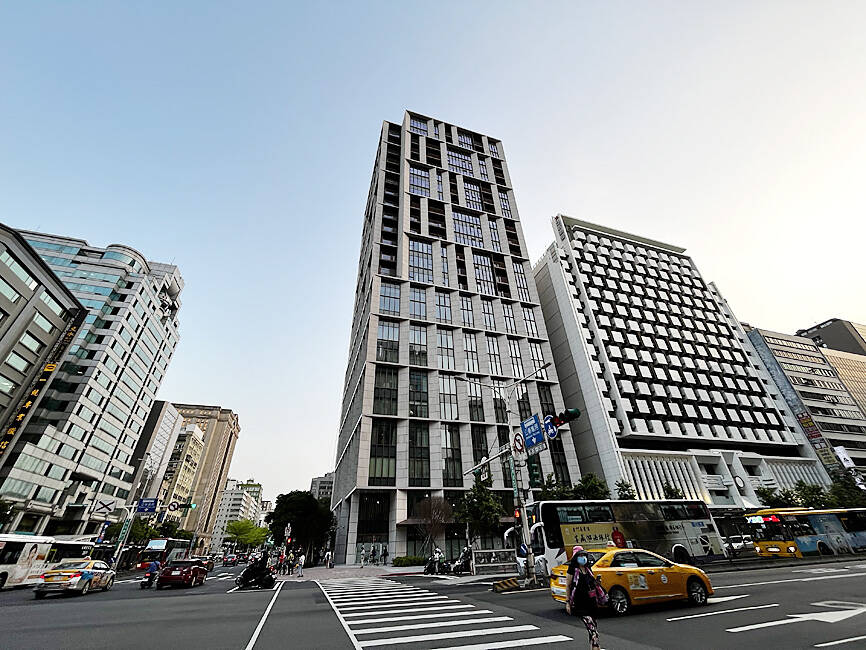Continental Development Corp (CDC, 大陸建設) is to auction floors of a mixed-use building in downtown Taipei that is currently occupied by Humble Boutique Hotel (寒居酒店), as it is winding down commercial properties, the bid’s organizer CBRE Taiwan (世邦魏理仕) said yesterday.
CDC, the development arm of Continental Holdings Corp (CHC, 欣陸投控), is looking for a reserve price of NT$4.15 billion (US$130.24 million) for the first to ninth floors of a complex in the city’s Zhongshan District (中山) near MRT Songjiang-Nanjing Station, the broker said.
The floors total 3,029.77 ping (10,016m2) with an additional 39 parking spaces in a building that has 24 floors above ground and six basement floors, it said.

Photo: Hsu Yi-ping, Taipei Times
CDC wrapped up construction of the complex in 2021 and has already sold all the apartment units above the hotel at NT$1.7 million per ping.
Occupancy rates have improved at Humble Boutique after Taiwan ditched COVID-19 restrictions, making it an attractive tenant, it said, adding that the lease is valid for another 18 years.
New commercial properties for sale are few and far between in Taipei’s popular locations, as most buildings are either owned by life insurance companies to generate rent income or increasingly used as corporate headquarters, it said.
CHC chief executive officer Cindy Chang (張方欣) recently told an investors’ conference that the group plans to take profits from existing commercial properties at home and abroad when it sees fit.
Hotel operations are not the group’s core business after all, Chang said. The auction is slated for June 12.
CHC also has a joint venture with the Ambassador Hotel Kaohsiung (高雄國賓大飯店) to regenerate the property that could start to make profit contributions in 2028.

Taiwanese suppliers to Taiwan Semiconductor Manufacturing Co. (TSMC, 台積電) are expected to follow the contract chipmaker’s step to invest in the US, but their relocation may be seven to eight years away, Minister of Economic Affairs J.W. Kuo (郭智輝) said yesterday. When asked by opposition Chinese Nationalist Party (KMT) Legislator Niu Hsu-ting (牛煦庭) in the legislature about growing concerns that TSMC’s huge investments in the US will prompt its suppliers to follow suit, Kuo said based on the chipmaker’s current limited production volume, it is unlikely to lead its supply chain to go there for now. “Unless TSMC completes its planned six

Intel Corp has named Tasha Chuang (莊蓓瑜) to lead Intel Taiwan in a bid to reinforce relations between the company and its Taiwanese partners. The appointment of Chuang as general manager for Intel Taiwan takes effect on Thursday, the firm said in a statement yesterday. Chuang is to lead her team in Taiwan to pursue product development and sales growth in an effort to reinforce the company’s ties with its partners and clients, Intel said. Chuang was previously in charge of managing Intel’s ties with leading Taiwanese PC brand Asustek Computer Inc (華碩), which included helping Asustek strengthen its global businesses, the company

Power supply and electronic components maker Delta Electronics Inc (台達電) yesterday said second-quarter revenue is expected to surpass the first quarter, which rose 30 percent year-on-year to NT$118.92 billion (US$3.71 billion). Revenue this quarter is likely to grow, as US clients have front-loaded orders ahead of US President Donald Trump’s planned tariffs on Taiwanese goods, Delta chairman Ping Cheng (鄭平) said at an earnings conference in Taipei, referring to the 90-day pause in tariff implementation Trump announced on April 9. While situations in the third and fourth quarters remain unclear, “We will not halt our long-term deployments and do not plan to

TikTok abounds with viral videos accusing prestigious brands of secretly manufacturing luxury goods in China so they can be sold at cut prices. However, while these “revelations” are spurious, behind them lurks a well-oiled machine for selling counterfeit goods that is making the most of the confusion surrounding trade tariffs. Chinese content creators who portray themselves as workers or subcontractors in the luxury goods business claim that Beijing has lifted confidentiality clauses on local subcontractors as a way to respond to the huge hike in customs duties imposed on China by US President Donald Trump. They say this Chinese decision, of which Agence